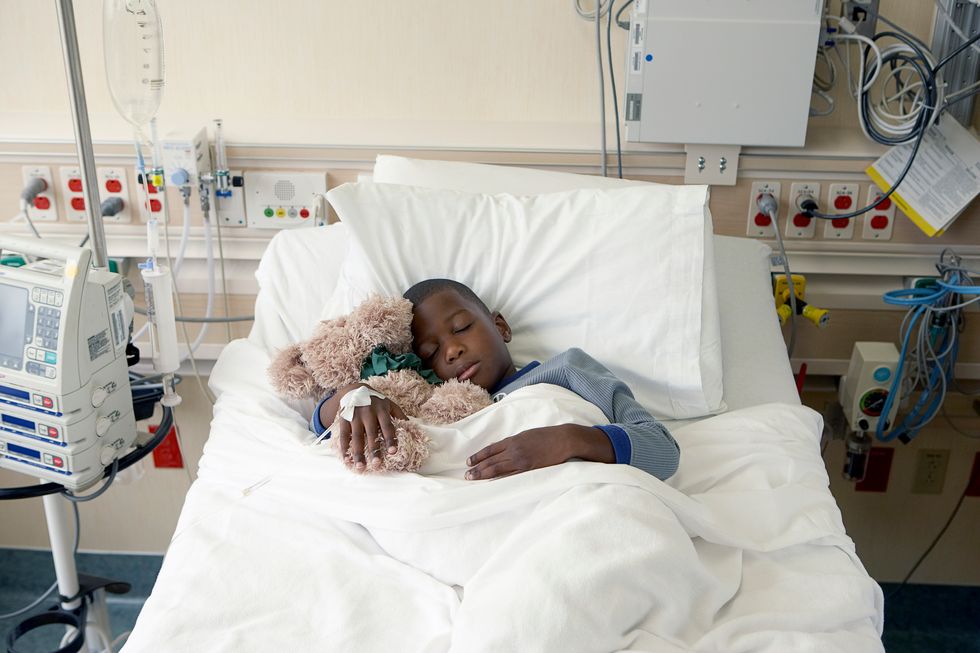
WEDNESDAY, Jan. 10, 2018 (HealthDay News)—Black children are more than twice as likely as white kids to die from surgery complications in the United States, a new study suggests.
Researchers found that black kids more often had risk factors that raised their odds of dying within 30 days of surgery. They were more likely, for example, to need blood transfusions or to be placed on ventilators to help them breathe.
But even when compared to white children with the same risk factors, black kids were relatively more likely to die.
It's not clear why, the study authors said.
"We definitely need further investigation to find out why these risk factors are more prevalent, and more strongly associated with risk of death, among black children," said lead researcher Oguz Akbilgic, of the University of Tennessee Health Science Center.
The good news: The average risk of a child dying after surgery was still very low. Among white children, the study found, the risk was just under 0.003 percent, while black kids faced a 0.006 percent risk.
Still, Akbilgic said, that translated into a more than twofold higher risk for black children.
Dr. Nia Heard-Garris, of Lurie Children's Hospital of Chicago, agreed that "it's troubling when we have studies saying that being a person of color is a risk factor."
However, she explained, race is often a "proxy" for other factors, such as social conditions and access to health care.
It's possible, according to Heard-Garris, that black children are more likely than white kids to have surgery at "low-volume" hospitals—those with less experience performing the procedure.
Other research has found that to be true of black adults, she added.
Difficulty getting health care at all could be a factor, too—whether that's because of money or because the nearest hospital is an hour away, she said.
"This study is a starting point," said Heard-Garris, who wrote an editorial published online with the findings Jan. 10 in the journal Pediatrics.
Now researchers need to figure out the reasons behind the disparity, she said.
The study results are based on a national database with information on pediatric surgeries at dozens of U.S. hospitals. Akbilgic's team looked at outcomes of over 183,000 surgeries performed between 2012 and 2014.
In general, the study found, black children and teenagers were more likely to have certain conditions or complications that raised their risk of dying after surgery.
In the study, just over 6 percent had a blood disorder, like hemophilia, versus just under 3 percent of white children. And over 4 percent needed to be placed on a ventilator after surgery, compared with 2.5 percent of white children.
But, the researchers found, it wasn't just a matter of black kids having more risk factors. Some risk factors also appeared to be more deadly for black children than for white children.
For example, when black children ended up on a ventilator, their risk of dying was over 10 percent. When that happened to white children, the risk of death was roughly 7 percent.
Akbilgic said he and his colleagues will now try to dig into the social factors that might be at work.
"For example," he said, "it's worth investigating whether the higher prevalence of ventilator dependency or oxygen support is associated with the air and housing quality of children's neighborhoods."
For now, Heard-Garris encouraged parents to ask questions if they are told their child should have surgery.
Besides seeking a second opinion, she said, parents can try to learn more about the surgeon's and hospital's experience.
"You can ask, 'How many of these surgeries have you done in the last year?' And, 'How many has this hospital performed?' " Heard-Garris said.
Minority patients can be particularly hesitant to question doctors, Heard-Garris noted. But if anything, she said, the new findings should help parents "feel empowered" to ask questions.
WEDNESDAY, Jan. 10, 2018 (HealthDay News)—Black children are more than twice as likely as white kids to die from surgery complications in the United States, a new study suggests.
Researchers found that black kids more often had risk factors that raised their odds of dying within 30 days of surgery. They were more likely, for example, to need blood transfusions or to be placed on ventilators to help them breathe.
But even when compared to white children with the same risk factors, black kids were relatively more likely to die.
It's not clear why, the study authors said.
"We definitely need further investigation to find out why these risk factors are more prevalent, and more strongly associated with risk of death, among black children," said lead researcher Oguz Akbilgic, of the University of Tennessee Health Science Center.
The good news: The average risk of a child dying after surgery was still very low. Among white children, the study found, the risk was just under 0.003 percent, while black kids faced a 0.006 percent risk.
Still, Akbilgic said, that translated into a more than twofold higher risk for black children.
Dr. Nia Heard-Garris, of Lurie Children's Hospital of Chicago, agreed that "it's troubling when we have studies saying that being a person of color is a risk factor."
However, she explained, race is often a "proxy" for other factors, such as social conditions and access to health care.
It's possible, according to Heard-Garris, that black children are more likely than white kids to have surgery at "low-volume" hospitals—those with less experience performing the procedure.
Other research has found that to be true of black adults, she added.
Difficulty getting health care at all could be a factor, too—whether that's because of money or because the nearest hospital is an hour away, she said.
"This study is a starting point," said Heard-Garris, who wrote an editorial published online with the findings Jan. 10 in the journal Pediatrics.
Now researchers need to figure out the reasons behind the disparity, she said.
The study results are based on a national database with information on pediatric surgeries at dozens of U.S. hospitals. Akbilgic's team looked at outcomes of over 183,000 surgeries performed between 2012 and 2014.
In general, the study found, black children and teenagers were more likely to have certain conditions or complications that raised their risk of dying after surgery.
In the study, just over 6 percent had a blood disorder, like hemophilia, versus just under 3 percent of white children. And over 4 percent needed to be placed on a ventilator after surgery, compared with 2.5 percent of white children.
But, the researchers found, it wasn't just a matter of black kids having more risk factors. Some risk factors also appeared to be more deadly for black children than for white children.
For example, when black children ended up on a ventilator, their risk of dying was over 10 percent. When that happened to white children, the risk of death was roughly 7 percent.
Akbilgic said he and his colleagues will now try to dig into the social factors that might be at work.
"For example," he said, "it's worth investigating whether the higher prevalence of ventilator dependency or oxygen support is associated with the air and housing quality of children's neighborhoods."
For now, Heard-Garris encouraged parents to ask questions if they are told their child should have surgery.
Besides seeking a second opinion, she said, parents can try to learn more about the surgeon's and hospital's experience.
"You can ask, 'How many of these surgeries have you done in the last year?' And, 'How many has this hospital performed?' " Heard-Garris said.
Minority patients can be particularly hesitant to question doctors, Heard-Garris noted. But if anything, she said, the new findings should help parents "feel empowered" to ask questions.
SOURCES: Oguz Akbilgic, Ph.D., University of Tennessee Health Science Center, Memphis; Nia Heard-Garris, M.D., M.Sc., attending physician, Lurie Children's Hospital of Chicago, instructor, pediatrics, Northwestern University Feinberg School of Medicine, Chicago; Jan. 10, 2018, Pediatrics, online
Copyright © 2018 HealthDay. All rights reserved.







